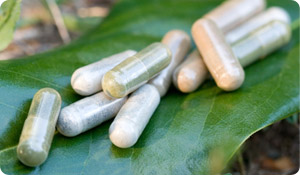
Herbal weight loss supplements are made from natural ingredients. So they can't hurt you, right? Wrong.
In the past, "natural" weight loss supplements often contained ephedra, an herbal stimulant that may help with short-term weight loss but is also associated with heart attack and stroke. Also known as Ma huang, Ephedra was banned for sale by the Food and Drug Administration and all products containing the herb were removed from American markets in 2004.
These days, over-the-counter herbal weight loss supplements are likely to contain concentrated amounts of caffeine, ginseng, guarana, hoodia and green tea, all natural products used for centuries as stimulants, appetite suppressants and tonics to promote well being and not likely to cause harm when used individually and in moderation. The amounts of these substances used in supplement form are not regulated, however, and their effectiveness as weight loss tools is unproven.
What is scariest about unregulated weight loss supplements are the unknowns. Between 2008 and 2010, the Food and Drug Administration found potentially harmful ingredients in more than 100 weight loss supplement products. Many of these ingredients are drugs normally available by prescription only or drugs not approved for use in the United States. None of the suspect ingredients were listed on the product label. As reported by the University of Utah Drug Information Service, the drugs included diuretics, antidepressants, anti-seizure medications and appetite suppressants
In addition to the possibility of undeclared ingredients, dangers common to all herbal and other "natural" over-the-counter weight loss supplements include the potential for abuse and overuse, and the potential for drug interactions when these products are used along with other medications.
Although scientific research on herbal medicines is limited in the Western countries, the use of herbs in Eastern cultures goes back centuries and is well documented. When herbal supplements are used in the context of Traditional Chinese Medicine (TCM), however, they are prescribed or recommended by trained practitioners in standardized amounts, and often custom-blended to suit individual needs and health requirements. Outside of legitimate TCM and holistic medical practices, however, the quality, dosage, safety and effectiveness of herbal supplements is largely hit-or-miss.
The bottom line: Talk to a qualified health care provider before you take any herbal diet supplements, especially if you have heart disease or if you are taking any other medications.
References:
Armstrong, J., Johnson, Pl, and Duhme, S. "The Effect of Commercial Thermogenic Weight Loss Supplement on Body Composition and Energy Expenditure in Obese Adults." Journal of Exercise Physiology Online. 4(2); May 2001 Web. 28 July 2010.
http://faculty.css.edu/tboone2/asep/Armstrong2.doc (PDF)
National Center for Complementary and Alternative Medicine. "Hoodia." 25 Nov 2009. Web. 29 July 2010.
Ohio State University Medical Center. "The Danger of Weight Loss Pills." Web. 28 July 2010.
http://medicalcenter.osu.edu/viewer/pages/index.aspx?itemid=708
Tufts University Program in Evidence-Based Complementary and Alternative Medicine. "Chinese Herbal Medicine." Tufts University Medical School and New England School of Acupuncture. 21 Nov 2008 Web. 28 July 2010.
University of Maryand Medical Center. "Herbal Medicine." 27 September 2009. Web. 28 July 2010.
http://www.umm.edu/altmed/articles/herbal-medicine-000351.htm
University of Utah: Alerts. "Weight Loss Products Containing Undeclared Active Ingredients." 26 July 10. Web. 28 July 10.
http://healthcare.utah.edu/pharmacy/alerts/352.htm
U.S. Food and Drug Administration. "FDA Issues Regulation Prohibiting Sale of Dietary Supplements Containing Ephedrine Alkaloids and Reiterates Its Advice That Consumers Stop Using These Products." 6 Feb 2004. Web. 28 July 2010.
http://www.fda.gov/NewsEvents/Newsroom/PressAnnouncements/2004/ucm108242.htm





